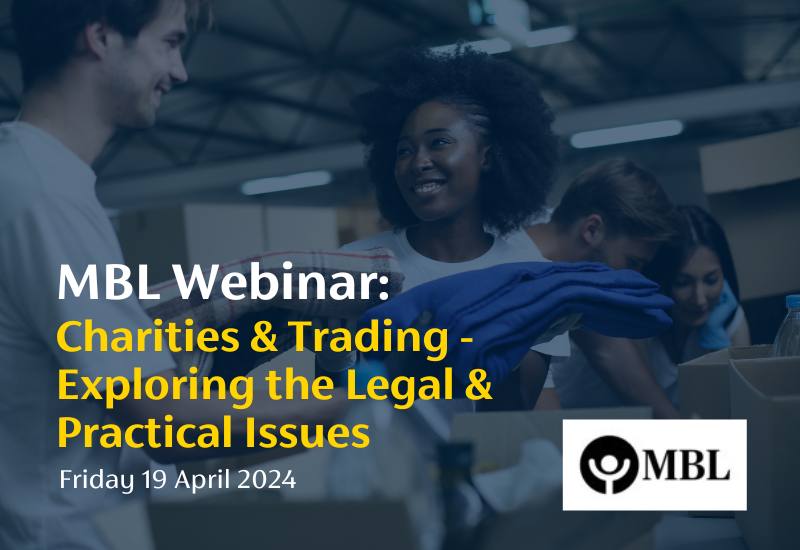- 27 Feb 2024
- •
- 3 min read
Charities: legacies and estate administration

As part of our Charities webinar programme we ran a webinar this month on legacies, estate administration and charities, which looked at some of the key issues that may arise with estate administration where a charity is a beneficiary. We have set out below some of the key points discussed during the webinar.
Legacies are of significant value to the charity sector. The Smee & Ford Legacy Trend Report 2023 estimated that the annual legacy income to charities hit an estimated at £3.7bn in 2022.
The types of gifts charities may be left under a Will are:
- Legacies: this may include a specific item, such as a property or shares; or could be a cash legacy.
- Residuary gifts: this is where the charity is entitled to a share of the residuary estate. This can be expressed as a percentage, or as a part or share of the estate.
As a legatee, you don’t have the same right to as much information about the estate compared to a residuary beneficiary.
If your charity is entitled to a share of the residuary estate, then you need to obtain more detail and will need to be in regular contact with the personal representatives appointed to administer the estate (the “PRs”).
Charities have a duty to maximise the income that is due to them, but this can sometimes be a difficult duty to balance when dealing with charitable gifts as the PRs may not be aware of the duties charities are under.
What you can do to be prepared:
- Charities should subscribe to Smee & Ford notifications, which will alert you if you have been named on someone’s Will.
- If left a gift, the charity should inform the PRs of their charity details, including charity number, any name changes, and if applicable, if any former charities have subsequently merged with them. You should ask the PRs to keep you informed as to the timeline for administering the estate and any key issues or delays.
You may want to consider preparing a fact sheet which you can provide to PRs when requested, listing for example; change of name, bank details, registered charity number, details of tax exemptions-reduced rate of Inheritance Tax, exemptions from Capital gains tax etc.
- Be aware of the bank de-minimus rules, enabling accounts to be closed without a grant of probate, in specific circumstances.
- If receiving a residuary gift, check the estate accounts on receipt, make sure tax reliefs have been claimed and applied correctly.
- Be alive to the possibility of a Deed of Variation procedure, which may be an option to maximise income and save on Inheritance Tax.
Contentious Trust and Probate claims
There has been a steep rise in the number of claims recently. There are a number of possible reasons for this including:
- Estate values increasing (often as a result of property prices);
- Costs of living crisis – people more reliant on inheritances;
- Greater awareness of the right to bring claims – High profile claims involving celebrities and press, social media which has brought these claims to the forefront of peoples mind;
- Aging population, increasing numbers of dementia sufferers – can make wills more susceptible to challenge.
The common types of claims that may affect charity legacies are:
- Claims by disappointed beneficiaries under the Inheritance (Provision for Family & Dependants) Act 1975 for reasonable financial provision.
- Will validity challenges.
- Proprietary estoppel claims.
- Constructive trust and resulting trust claims.
- Claims concerning lifetime transactions – financial abuse/presumed undue influence.
- Claims against PRs.
We discussed the different types of claims in the webinar, including when they may be brought, and the difficulties with the types of claims and time limits.
Key considerations for charities with these claims are:
- To preserve the legacies – they are duty bound to do so;
- Minimising risks of bad press and reputational damage (may need to consider if any press would amount to a serious incident in accordance with the Charity Commission’s serious incident reporting regime);
- Keeping costs to a minimum.
There may be ways to resolve these claims, including where appropriate ex gratia payments, a firm rebuttal, alternative dispute resolution (negotiations, mediation), and as a last resort, court proceedings. If your charity does find that a claim is being made against a legacy they are due, they should ensure that they seek appropriate advice and support and ensure that the matter is carefully and appropriately managed.
If you would be interested in being sent a recording of the webinar or the slides, or have any questions or would like to speak to a member of our team please do get in touch with us.





